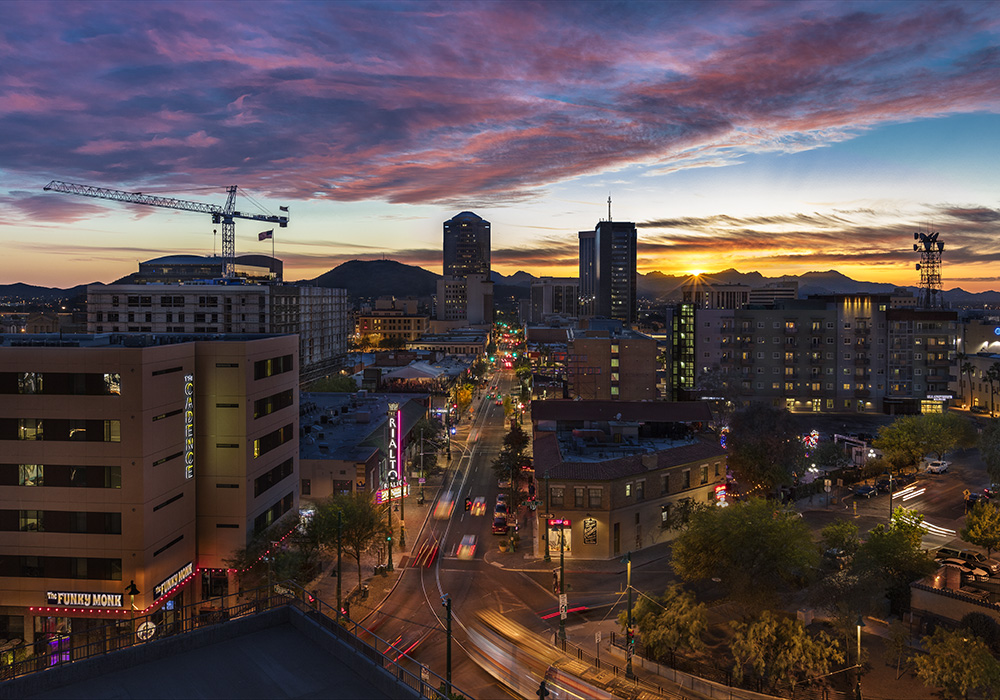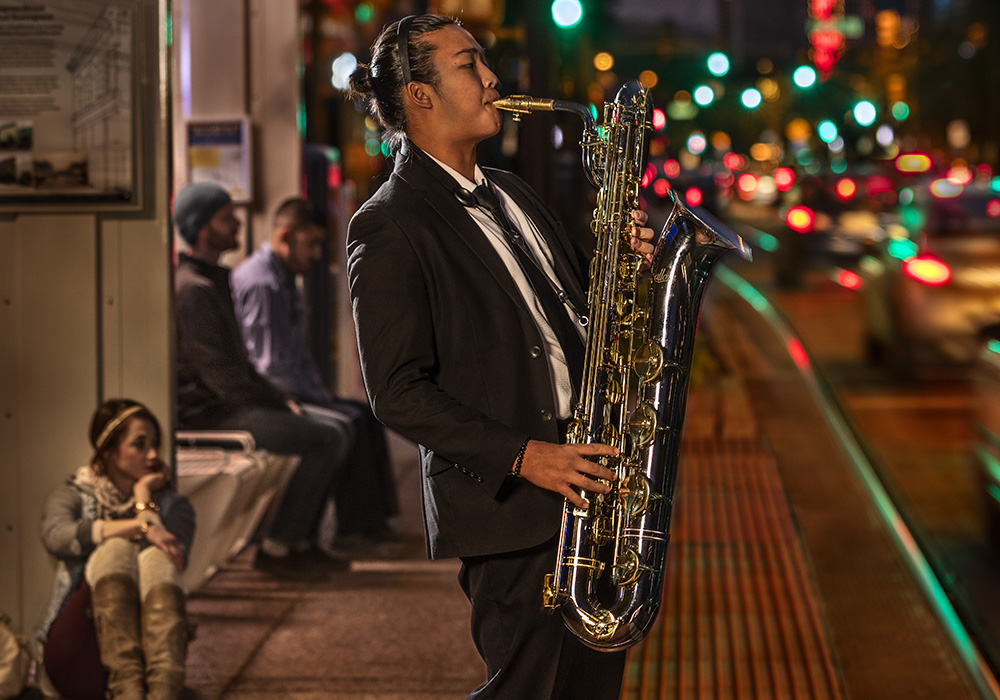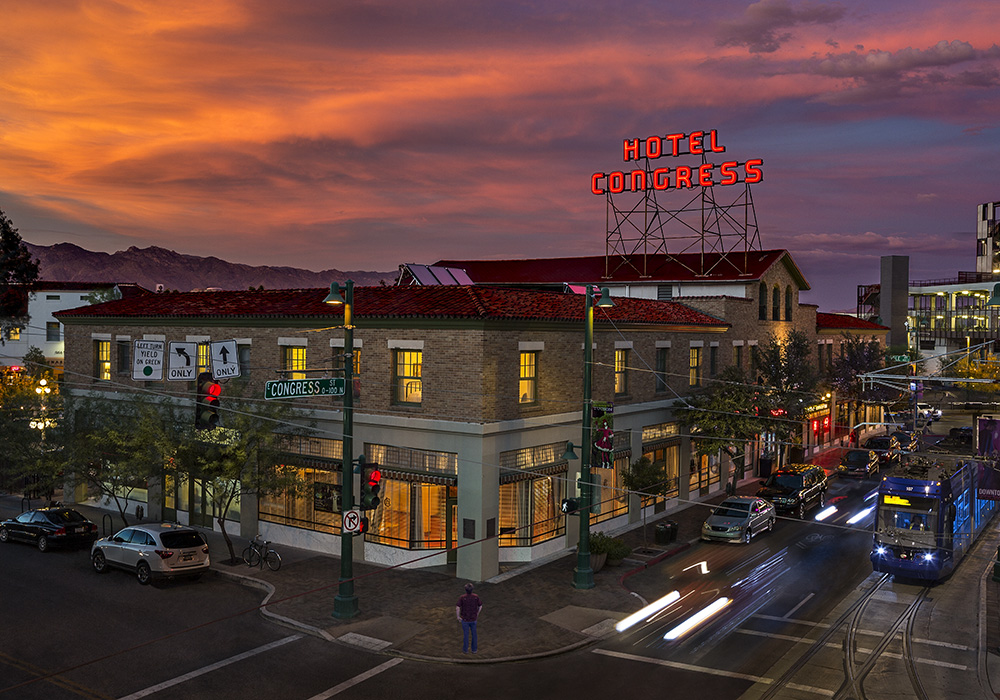Congress Street: Tucson, Arizona
Planning Excellence
In Tucson's early days, Congress Street was one of the city's most vibrant and well-used downtown commercial corridors. But as Arizona's population began to skyrocket and car traffic became the primary focus for many planners, the street gradually became less friendly to people walking.
In the late 1990s and early 2000s, Tucson officials, planners, and engineers devised a series of inventive plans to reinvigorate the local economy and restore its commercial luster. Most importantly, Congress Street underwent several major renovations that restored mode-sharing to the street.

A view of Tucson's beautiful sunset down Congress Street to Church Avenue. Photo courtesy Steven Meckler.
For the first time in many years, car-centric planning strategies were no longer the priority for downtown's most important corridor. Congress Street was reduced from three lanes to two. Its sidewalks were widened to encourage more pedestrian activity, trees were planted to help mitigate the relentless Arizona heat, and bike parking was added for cyclists.
In 2014, the city began operating SunLink, a modern streetcar. The SunLink route spans Congress Street and connects downtown businesses, neighborhoods, and the University of Arizona. This investment in transit infrastructure — funded by a U.S. Department of Transportation TIGER Discretionary Grant — was a primary catalyst for new development along Congress Street.
Hoping to revive Congress Street's sense of place and history, city officials assisted with the restoration of the Rialto Theatre and the Fox Tucson Theatre, two iconic cultural establishments that bookend Congress Street. To further celebrate the street's rich history and utilize existing resources, the city implemented a low-cost, high-return building facade improvement matching grant program, which restored a dozen historic storefronts along Congress Street, helping to create a cohesive visual identity for the area.
The City of Tucson's two-pronged approach of capitalizing on historical and cultural assets and greatly enhancing multimodal accessibility has brought Congress Street back to life as a vital economic hub.

Congress Street is a major cultural hub for Tucson and hosts an array of events, including the annual Tucson Jazz Fest every January. Photo courtesy Steven Meckler.
Defining Characteristics and Features
- Hotel Congress, along with the Rialto and Fox Tucson Theatres, contribute to the revitalized sense of place and have established Congress Street as Tucson's premiere destination for entertainment.
- Congress Street hosts a multitude of recurring events that activate the space throughout the year, including Meet Me at Maynards, a social walk/run that draws 500 participants every Monday evening, and Second Saturdays Downtown, a monthly festival featuring a large variety of live entertainment, open galleries, vendors, and food trucks.
- Largely built out by the late 1920s, the street is lined on both sides with historic structures and signage, providing opportunities for adaptive reuse by modern businesses.
By the Numbers
- 67 new businesses have opened along Congress Street since 2008
- 25 restaurants are currently operating along Congress Street, 16 of which are in historic buildings and 22 of which are locally owned or Arizona based
- 8 murals by 8 different local artists are featured along Congress Street thanks to the City of Tucson Mural Program, a partnership between the city and the nonprofit Tucson Arts Brigade
- 40 years is how long the Fox Tucson Theatre sat empty before it was revived as a significant community resource
- 12 historic buildings have had facades restored with private investment matching public funding at a ratio of 6:1
- 4 of SunLink's 23 stops are along Congress Street
- 2 restaurants run by James Beard award-winning chefs are located just off of Congress Street
Designated Area
Congress Street extends 1.63 miles from Toole Avenue on the east, which serves as a gateway to downtown, to Silverbell Road on the west, home of the historic Menlo Park Neighborhood and the Mercado District. The Congress Street commercial corridor runs about four-tenths of a mile between North Church Street and East Toole Avenue.

Congress Street's success can be attributed in great part to its combination of multimodal transportation improvements — like the SunLink streetcar — with its iconic historic buildings like the Hotel Congress, which first opened in 1919. Photo courtesy Steven Meckler.


